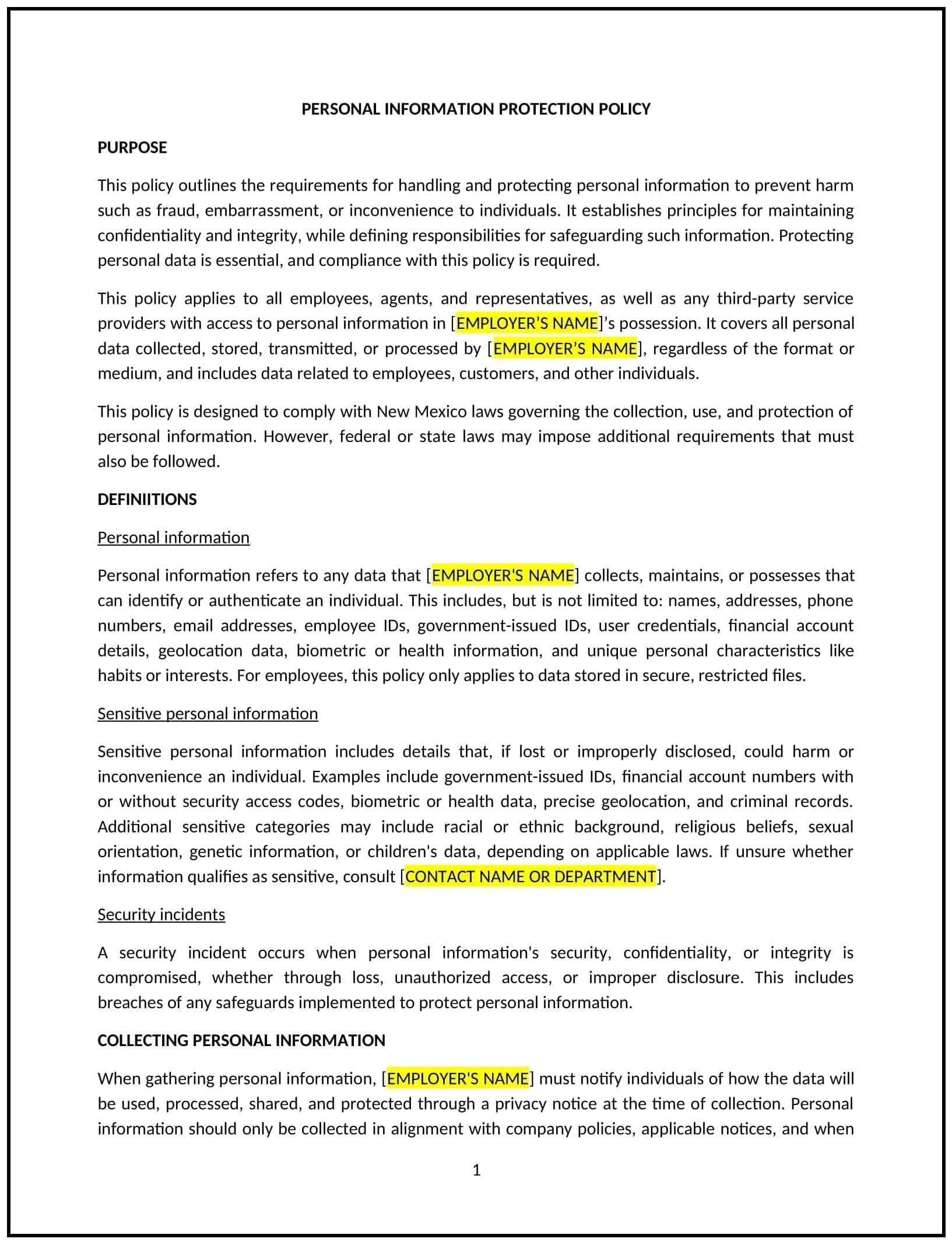Personal information protection policy (New Mexico): Free template
Got contracts to review? While you're here for policies, let Cobrief make contract review effortless—start your free review now.

Customize this template for free
Personal information protection policy (New Mexico)
This personal information protection policy is designed to help New Mexico businesses safeguard sensitive employee, customer, and business information. It outlines the company’s approach to collecting, storing, processing, and sharing personal data to prevent unauthorized access and reduce the risk of data breaches. The policy is intended to ensure that all personal data handled by the business is protected in compliance with privacy laws and best practices.
By adopting this policy, New Mexico businesses can help mitigate the risk of data theft, maintain customer trust, and ensure that personal information is used appropriately and securely within the organization.
How to use this personal information protection policy (New Mexico)
- Define personal information: Clearly define what constitutes personal information, including data that can identify an individual such as names, addresses, Social Security numbers, financial information, and other personally identifiable information (PII).
- Outline data collection practices: Specify the types of personal information that the business collects from employees, customers, and third parties, and the purposes for which it is collected.
- Establish data storage and access controls: Implement measures to ensure that personal information is stored securely, with limited access to only authorized personnel. This may include encryption, secure storage methods, and access logs.
- Set guidelines for data sharing: Clearly define when and how personal information may be shared with third parties, such as service providers or contractors. Ensure that all data sharing is done in accordance with privacy laws and the business’s internal policies.
- Reflect New Mexico-specific considerations: Include any New Mexico-specific privacy laws, such as the New Mexico Data Breach Notification Act, and industry-specific privacy requirements, such as those applicable to healthcare or financial services.
Benefits of using this personal information protection policy (New Mexico)
Implementing this policy provides New Mexico businesses with several advantages:
- Protects sensitive data: The policy helps businesses safeguard sensitive information, preventing unauthorized access or misuse that could result in financial loss, identity theft, or reputational damage.
- Promotes customer trust: By committing to protect personal information, businesses can increase customer confidence and trust, which is critical in maintaining long-term relationships.
- Reduces legal and financial risks: A robust personal information protection policy helps businesses minimize the risk of non-compliance with New Mexico’s privacy laws, as well as federal regulations like the Health Insurance Portability and Accountability Act (HIPAA) or the General Data Protection Regulation (GDPR), when applicable.
- Enhances business credibility: Businesses that prioritize data security and personal information protection enhance their reputation, demonstrating their commitment to privacy and security in the marketplace.
- Improves operational efficiency: A structured policy for handling personal information streamlines data management and helps prevent data breaches, reducing operational disruptions caused by security incidents.
Tips for using this personal information protection policy (New Mexico)
- Communicate the policy clearly: Ensure all employees understand the policy and their responsibilities in protecting personal information. The policy should be included in the employee handbook and communicated during onboarding and training sessions.
- Implement security measures: Businesses should use appropriate technical, administrative, and physical safeguards to protect personal information, including encryption, firewalls, and regular security audits.
- Train employees on privacy practices: Provide regular training on privacy and data protection, including how to handle personal information securely, how to recognize phishing attempts, and how to report potential security breaches.
- Monitor access to personal information: Regularly review who has access to personal information within the company and ensure that access is limited to authorized personnel.
- Review and update the policy regularly: The policy should be reviewed at least annually to ensure it remains aligned with New Mexico laws and federal privacy regulations, as well as any changes in business practices or technology.